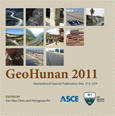Intelligent Compaction for Improving Roadway Construction
Publication: Emerging Technologies for Material, Design, Rehabilitation, and Inspection of Roadway Pavements
Abstract
Quality control (QC) and quality assurance (QA) tests for compaction in construction projects are typically based on density measurements. The main issue regarding density-based QC/QA specifications is that they do not relate to mechanistic properties of materials and modulus that are critical to mechanistic-empirical types of pavement designs (MEPDG). Another concern is that the depth of influence of density measurement is restricted to 300 mm that is insufficient to detect deeper weak spots that are critical during subgrade or subbase compaction. In intelligent compaction (IC) technology the stiffness of the materials can now be identified to provide real-time opportunities to address the above issues and uniformity during compaction of the materials. Intelligent compaction rollers are equipped with roller-integrated measurement systems, global position system (GPS) and on-board displays that provide real time and 100%-coverage evaluation of the materials being compacted. Therefore, IC can bridge the gap between roadway design and roadway performance. Improved pavement engineering leads to the improvement of the design and construction of roadways and extends the life of pavements. This paper provides guidelines for future QC/QA specifications based on extensive IC field validations and knowledge gained from the US FHWA/Transportation Pooled Fund (TPF) IC study. The guidelines will cover all roadway materials from the ground up including subgrade, subbase (including granular and stabilized base), and hot mix asphalt materials. The aspects of the guidelines include: (1) qualifying IC equipment, (2) specifying GPS equipment and requirements, (3) validating IC systems and GPS operations onsite, (4) mapping existing support materials, (5) selecting in-situ tests for calibration, (6) specifying data collection procedures for IC and in-situ tests, and (7) analyzing data and producing reports. All the above come with real world experiences from more than a dozen full scale IC projects. By implementing the IC QC/QA guidelines proposed in this paper, the process of designing and constructing our roadways will lead to the improved performance of roadway systems.
Get full access to this article
View all available purchase options and get full access to this chapter.
Information & Authors
Information
Published In
Copyright
© 2011 American Society of Civil Engineers.
History
Published online: Apr 26, 2012
ASCE Technical Topics:
- Compacted soils
- Compaction (material)
- Construction engineering
- Construction industry
- Construction management
- Design (by type)
- Engineering fundamentals
- Field tests
- Geomechanics
- Geotechnical engineering
- Highway and road design
- Infrastructure
- Infrastructure construction
- Intelligent transportation systems
- Material mechanics
- Material properties
- Materials characterization
- Materials engineering
- Pavement design
- Sight distances
- Soil mechanics
- Soils (by type)
- Tests (by type)
- Transportation engineering
- Transportation management
Authors
Metrics & Citations
Metrics
Citations
Download citation
If you have the appropriate software installed, you can download article citation data to the citation manager of your choice. Simply select your manager software from the list below and click Download.
